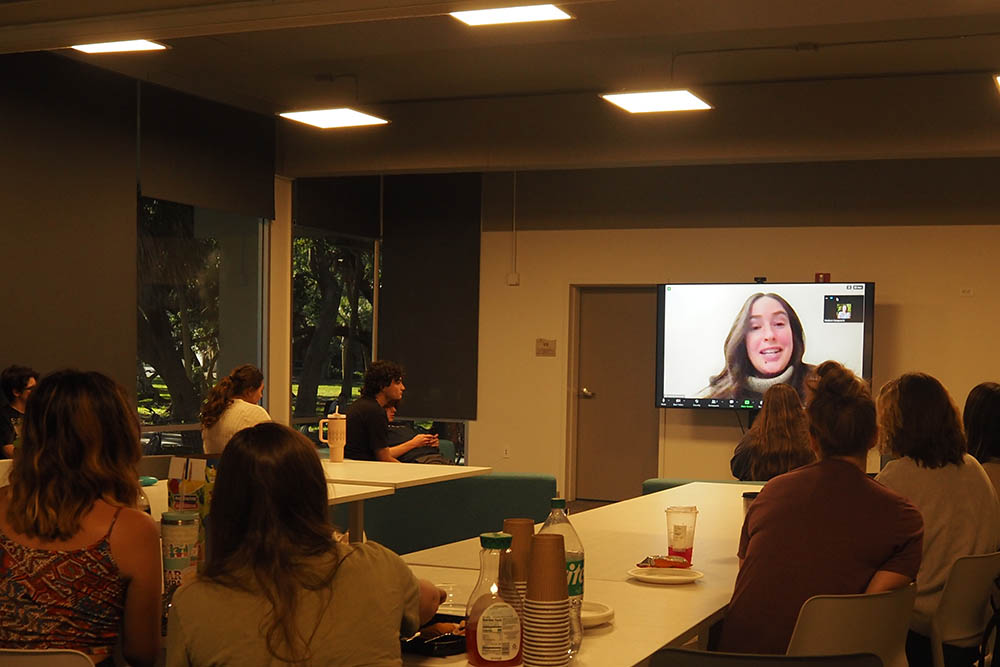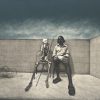When the coo of a humpback whale faded out and the episode of the Apple TV+ Earthsounds documentary series ended, Amanda Sosnowski ’13—the episode’s researcher—joined the Zoom squares to answer Eckerd College students’ questions.
Sosnowski explained how her journey brought her from studying marine science at Eckerd to filmmaking abroad.
Sosnowski’s experience with acoustic research began at Eckerd, studying under Visiting Assistant Professor of Environmental Studies Peter Simard, Ph.D., and Professor of Biology and Marine Science Shannon Gowans, Ph.D.
“Eckerd really set me up well for this career path,” she said.
From humpback whale songs to pistol shrimp sonic bubble battles to spinner dolphin body slams, the Pacific Ocean is full of peculiar sounds. And this fourth episode, “The Pacific,” dives into the science and strategy of these sonic phenomena. Eckerd College’s Marine Science Club and Career Center teamed up to screen this documentary on April 15. Although Sosnowski’s career as a filmmaker has taken her to the United Kingdom, through a connection with Employer Relations and Internship Coordinator Madison Gumprecht ’21 in the Career Center, Sosnowski agreed to host a Q&A session on Zoom following the documentary.
After she’d graduated from Eckerd, Sosnowski worked for the U.S. Geological Survey before returning to school. She earned her Master of Science in marine biology and biological oceanography from the University of South Florida, which is where her passion for filmmaking blossomed. She later earned a Master of Arts in Wildlife Filmmaking from the University of the West of England.

Amanda Sosnowski ’13 talks with Marine Science Club members over Zoom. Photo by Ashlyn Fransen ’24
“I love film, and in grad school, I began consuming science media outside the normal bubble,” Sosnowski said.
An entry-level film assistant position led to freelance work, which led to an opportunity with Offspring Films, so Sosnowski moved to Bristol, England, where she works on conservation, natural history and wildlife documentaries.
She explained the creative thinking that researching underwater sonic environments requires. Many underwater calls occur outside of human hearing ranges. Scientists have developed harmless suction-cup cameras (as seen in Earthsounds) to collect data. The cameras stay attached for up to 24 hours before detaching, and they are then retrieved and analyzed by scientists. The pistol shrimp and other small species are more easily studied in labs and filmed in studios. She also mentioned the lighting and focus complications of underwater filming.
“I didn’t realize how much research goes into the films,” Sosnowski said. “It’s really satisfying for the scientist in me. With animals, you never really know what you’re going to get.”
Storytelling often happens in the editing process. This is where Sosnowski gets to use her “creative brain” and really embrace Eckerd’s motto to “ThinkOutside.”
Currently, she’s working on another documentary series for Apple TV+ and is pursuing funding for an independent conservation short film.
As a student interested in marine bioacoustics, Kaitlyn Glover, a junior marine science and environmental studies student from Woodstock, Georgia, was excited to see a film fully devoted to the field. Several students asked questions about Sosnowski’s equipment and gear, which showed that this event, while marine science focused, also appealed to students of other disciplines. The Marine Science Club aims to expand students’ ways of thinking about marine science and how it connects to the world around them. This event achieved that goal by showcasing that marine science can be interdisciplinary.
“Amanda’s story inspires myself and others to ‘ThinkOutside’ and not limit our possibilities for our future,” said Megan Miller, a sophomore marine science student from Washington and an organizer of the documentary screening.
“There’s not just one way to get where you want to be,” Sosnowski said. “At Eckerd, anything is possible.”












